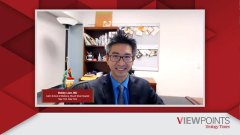
Managing AEs for ARI Therapy in Advanced Prostate Cancer
Bobby Liaw, MD, and Vivek K. Narayan, MD, MS, share clinical pearls for the management of adverse events from ARI-directed therapy in advanced prostate cancer.
Episodes in this series

Neal Shore, MD, FACS:Here’s the thing that I find myself saying more and more, especially to my urology friends: you can’t just start a therapy, whether it’s T [regulatory T-cell] suppression, an AR [androgen receptor] pathway inhibitor, or even a taxane, and say, “The PSA [prostate-specific antigen] went down. I’m declaring victory.” You mentioned fractures. There must be a strategy around avoidance of fragility fractures and metastases-related fractures, cardio-oncologic effects, neuro-oncologic effects, and fatigue. Fatigue is the bane of all cancer therapies. What are some pearls before we get to PSMA [prostate-specific membrane antigen] PET. Bobby, what are you doing with your patients? What are you teaching about these issues, these toxicities? We’re keeping patients living longer, we’re delaying metastases, we’re keeping them out of the emergency department, and we’re keeping them out of an inpatient facility. These are big cost factors, but what about fractures, cognition, and cardiovascular issues? What are your strategies?
Bobby Liaw, MD: I wish I could tell you that I had the perfect strategy, but I don’t. As we’ve been working over the last couple of years in terms of intensifying AR-directed therapies for a lot of our patients, more and more I have to be more proactive in asking if you’ve had a bone-density test recently. If you haven’t, I’m going to get you 1. Are you taking supplements like vitamin D and calcium? If you’re not, I’m going to prescribe it for you. I’m no longer waiting for them to go back to their primary care doctors to have these things evaluated. For my patients who have a history of cardiovascular disease, whether it’s badly controlled hypertension or a history of some cardiovascular disease, I’m telling them to go back to see their cardiologist. There’s only so much that I can do myself. We still have to reach out to other specialties.
In time, we do need to have more of a network of people we reach out to and help manage some of these long-term toxicities. We’ve become very good for the multi-disciplinary areas like radiation oncology, urologic surgeons, and medical colleague. We’re good at working together, but a lot of these other adverse effects fall outside these disciplines’ purview. I don’t want to say everyone, but I’ll use myself as an example. In the past, I’ve been more relaxed in considering these things. It has to rattle around in your brain. As we help people live longer, we also must understand all the other things that we’re causing by prescribing all these treatments.
Neal Shore, MD, FACS: I love your candor because it’s not enough to say T suppression, worry about hot flashes and sweats, decreased energy, ARPI [androgen receptor pathway inhibitor] drugs, a little more fatigue. There are other things going on. Vivek, what are your strategies? I love my colleagues who are in teaching centers because they’re being challenged. Now you’ve got your fellows and residents, who are saying what’s state of the art in terms of preventive care?
Vivek K. Narayan, MD, MS: The discussion I often have with patients is that there’s this duality—what patients worry about when they read about the medications, and things like fatigue, hot flashes, etc. But from the medical standpoint, in treating prostate cancer, we have to worry about all the symptoms patients may not have, and we have to monitor them from a medical comorbidity standpoint. What I described to fellows is this frailty complex that can occur with this potent energy suppression for prolonged periods of time. This is sarcopenia, loss of bone mineral density, the potential for fracture fragility, fractures and falls, potentially neurocognitive issues—it’s those effects. Although patients may not notice or complain, we have to be attentive to them.
That alludes to what Bobby said about the importance of being proactive about doing the DEXA [dual x-ray absorptiometry] monitoring in men with metastatic castration-resistant disease and bone metastases. We know in ADT [androgen deprivation therapy] plus these AR inhibitors from studies like PEACE III and the radium-223 study that there’s a high rate of fractures in this population. These men need to be on some sort of bone supportive care, taking the calcium and vitamin D supplementation, engaging in some weight-bearing exercise, and monitoring their cardiovascular risk factors. Increasingly, this is part of the domain of treating prostate cancer that we all need to be comfortable with.
Neal Shore, MD, FACS: I fully agree. Great comments from both of you.
Transcript Edited for Clarity
Newsletter
Stay current with the latest urology news and practice-changing insights — sign up now for the essential updates every urologist needs.










